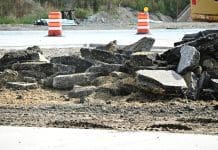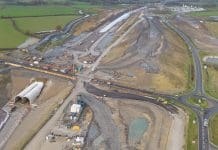Unite the union has warned that highways workers who are keeping the UK’s roads open are being prevented from adhering to social distancing guidelines
The highways workers, who are classified as key workers and are on outsourced contracts have been told that the client Highway England, has said that it should be business as usual.
While in some depots, canteens and mess areas have been closed, workers are still operating in two and three-person crews, travel together in cabs and also cannot social distance while on site.
Unite says it understands that it’s essential that emergency work such as repairing barrier damage, filling potholes, clearing up spillages and fixing boundary fences where there is nearby livestock needs to continue.
However, work such as cyclical maintenance and litter picking should be suspended until after the coronavirus crisis has ended. When concerns about this were raised on some contracts in northern England, workers were informed that Highways England had confirmed that “litter picking was a safety-critical activity”.
Emergency work only
Unite believes that if work was reduced to emergency work only highways workers could single crew and would be able to successfully socially distance, which would preserve their health and the health of their families.
On some contracts, Unite has secured an agreement that there will only be two workers on sites and there will be no rotation in work gangs. Access to canteens and locker rooms will be on a coordinated basis and if workers raise health and safety issues they will not be sent home without pay.
Greater efforts to ensure social distancing
Unite national officer for construction Jerry Swain, said: “Highways maintenance workers are essential workers who play a vital role keeping roads open and motorists safe.
“That does not mean that social distancing rules do not apply to them.
“Highways maintenance employers need to make far greater efforts to ensure that social distancing is applied at work.
“Highways England is clearly at fault, this is not business as normal. Emergency work of course needs to be undertaken but workers should not be placed at risk undertaking non-essential maintenance work.
“To suggest that collecting litter by the side of motorways and major roads is a safety critical activity demonstrates they have lost all perspective.
“The Department of Transport needs to intervene and ensure that its agency puts the safety of its workforce first.”













![[VIDEO] Heathrow’s third runway plan wins out over Arora London, United Kingdom – May 31, 2023: A commercial airliner taking off at London's Heathrow Airport, representing plans for a third runway](https://www.pbctoday.co.uk/news/wp-content/uploads/2025/11/iStock-2143084103-218x150.jpg)
